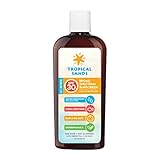Why Choose Biodegradable Sunscreen

It's better for you and for the oceans
As the number of skin cancer cases continues to grow each year, we've all been drilled on the importance of using sunscreen. But much less attention has been paid to the impact these sunscreens can have on our oceans.
When these lotions and sprays wash off during those fun trips to the beach, the chemicals do not simply vanish. They dissolve into the oceans and can kill coral reefs. That's why some places (such as certain parks in Mexico) are now requiring beachgoers to use biodegradable sunscreen. This isn't only good news for our oceans, but good news for our bodies, too.
Biodegradable sunscreen is a healthy choice for both people and our environment. Here's why.
(Image copyright Rido on Dreamstime.com)
In our quest to avoid our own health problems, we may inadvertently be damaging the health of our oceans.
According to a 2008 study published in the scientific journal Environmental Health Perspectives, about 4000 to 6000 metric tons of sunscreen washes off swimmers into oceans around the world every year. And that sunscreen could be killing coral reefs. The study identified four common ingredients found in most commercial sunscreens (paraben, cinnamate, benzophenone and camphor) that have been found to contribute to the death of coral reefs.
Because of this, some marine parks (most notably those in Mexico) are now requiring swimmers to use biodegradable sunscreen.
Fortunately, this is a good move for you AND the ocean.
Each year, the nonprofit Environmental Working Group publishes a sunscreen guide that rates hundreds of sunscreens, lip balms and cosmetics with SPF protection factors. Many of the most common sunscreens that include the reef-killing ingredients above also include chemicals that can be dangerous to humans, such as oxybenzone, which is a hormone disruptor and skin allergen, and retinyl palmitate, a compound that has been shown to cause skin cancer in laboratory tests. Choosing a natural biodegradable sunscreen, therefore, isn't just a good way to protect the health of our oceans, but also your own health.
(Poster of coral reef available on AllPosters)
Buy Biodegradable Sunscreen Online - If it doesn't say it, it's not biodegradable
How do you know if a sunscreen is biodegradable? A good rule of thumb is: If the label doesn't say it's biodegradable, it's probably not. Many people think anything with the word "natural" in the title is a safe bet, but that's not always the case. The best way to be sure your sunscreen doesn't have any of the reef-destroying chemicals listed above is to check the list of ingredients.
Here are a few popular options for biodegradable sunscreen.
If you're heading to the Cancun area, biodegradable sunscreen isn't just a healthy choice, it's the ONLY choice if you want to visit some of the aquatic parks in the area. The popular Xel-Ha park, for instance, bans sunscreens with any of the following ingredients.
"Benzophenone, Octyl metoxycinnamate, Octyl salicylate, Oxybenzone, Octinxate, Ethylhexyl, Homosalate, Octocrylene,Benzophenone,Butyl methoxydibenzoylmethane, Hexyldecanol, Dimethyl apramide, Cetyl dimethicone, Methylparaben, Polyethylene, Propylparaben, Butylcarbamate."
Other Mexican aquatic parks near Cancun and Cozumel with similar restrictions include Xcaret, Xplor and Garrafon Reef Park. Not all of these parks list ingredients that are prohibited, but they all indicate that only biodegradable sunscreens are allowed in the park.
"More than 60 percent of the world's reefs are under
immediate and direct threat from one or more local
sources..."
Reefs at Risk Revisited

Slip! Slap! Slop! Wrap!
Advice from the National Council on Skin Cancer Prevention
The National Council on Skin Cancer Prevention has designated the Friday before Memorial Day as "Don't Fry Day," a day to focus on ways to stay safe in the sun.
They offer the following skin protection tips.
* Slip on a shirt
* Slop on sunscreen of SPF 15 or higher
* Slap on a wide-brimmed hat.
* Wrap on sunglasses.
(Image provided by National Council on Skin Cancer Prevention)
The Centers for Disease Control says the most hazardous time for UV exposure is between 10 am to 4 pm daylight savings time in the continental US. But the actual risk for UV exposure varies by area and can change from day to day due to seasonal and weather variations. To help consumers determine when risk is the greatest, the Environmental Protection Agency and the National Weather Service developed a rating scale for UV radiation. The scale ranges from 1 (low) to 11+ (extremely high).
Click the map above or click here to see today's updated map and get information for your local area.
A score of 2 or less means low danger for the average person. A score of 6 or above indicates very high risk. Click here for more information on how to interpret the index.
(Image provided by the EPA)
Thanks for visiting!











